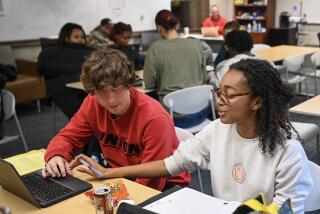Cheating: Students’ Fault, or Do Teachers Share Blame?
- Share via
Cheating is so widespread among high school students that it has become almost as traditional as the prom. Posted honor codes and signed honesty contracts haven’t put so much as a dent in a problem whose abuses and sophistication increase every year.
I was recently invited to a forum on cheating at a South County high school. Attending were other educators along with 15 of the school’s top senior students, all of whom had admitted to cheating. Laziness is often a reason why students cheat, but clearly these teens didn’t fall into that category. Hence, their stories offered a different take on the problem.
No matter what type of cheating these students were involved in, all agreed on one thing: A large percentage of cheating occurred as a direct result of an environment that either encouraged it or ignored it.
For starters, the students felt pressure to cheat when they were put in unfair learning situations. They were asked to complete unreasonable amounts of work, such as covering 1,000 pages a quarter of outside reading or memorizing hundreds of terms for a quiz. Their teachers seemed unaware or unconcerned that they had set expectations that no student could meet, mistaking huge quantities of work for “rigor.” Passing such classes meant resorting to dishonest tactics like faking the reading or splitting up the work with friends; such desperate measures were viewed more as a means of survival than as cheating.
The students also described teachers who routinely examined students on material that the instructors themselves either didn’t know or hadn’t covered in class. Rather than create an exam that tests students on what they had been taught, these teachers handed out someone else’s standardized tests. One girl reported that she asked the teacher to explain a question on one of these exams and was told, “I can’t help you. I didn’t write that question.”
Even when teachers do create good tests on what has been taught, students feel strongly that they also need a secure test environment. There are teachers who sit passively at their desks while the most blatant cheating goes on and some who leave the room altogether. Rather than showing “trust” in students, such behavior on the part of instructors was interpreted as simply not caring enough to take testing seriously.
One of the most disturbing examples of an environment that encourages dishonesty is the habit some teachers apparently have of grading essays and reports without reading them through. A number of students who had such instructors admitted to having written a dynamite first page and nonsense from that point on, still receiving a high grade. As soon as students caught on to the grading system, they took advantage of it. Why should anyone struggle over a paper no one is going to read? To turn in a bogus essay is definitely cheating, but the teacher set the standard.
An easy “out” for administrators is to say that honest students shouldn’t cheat, no matter what, thus avoiding having to deal with the situation. Even though they are well aware of what goes on in classrooms, they won’t act unless forced to. Teachers resent colleagues who give the profession a bad name, but are hesitant to blow the whistle. Parents are reluctant to complain because they don’t want the teacher in question to retaliate against their kids.
Students who took part in the forum made clear that they are uncomfortable with cheating, but they justify it to themselves because it’s directed at educators they don’t respect. Still, they are not comfortable with having to compromise their own integrity. In fact, that is the whole reason they participated in the forum. No one likes the situation, yet nothing is done about it, creating a conspiracy of silence. It seems that schools have cut a deal with everyone involved: You don’t expose the lousy teaching, and we’ll ignore the cheating.
Caring administrators, responsible teachers and frustrated parents need to band together, have forums such as the one described, complain, write letters, make phone calls and refuse to tolerate any situation that is clearly lacking in academic integrity.
The loudest protests ought to come from the students themselves. After all, it’s their education we’re talking about here. Before they complain about unfair teachers and absurd grading, they need to go on record against them. If they haven’t truly tried to change classroom situations that they view as unethical, then they can’t really justify cheating; they become simply another part of the problem.
Beyond the immediate fact that students are cheating on tests and papers is the larger issue: They are being cheated of an education.
*
Christine Baron is a high school English teacher in Orange County. You may reach her at educ@latimes.com or (714) 966-4550.
More to Read
Sign up for Essential California
The most important California stories and recommendations in your inbox every morning.
You may occasionally receive promotional content from the Los Angeles Times.










